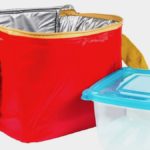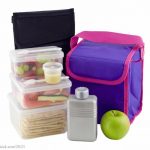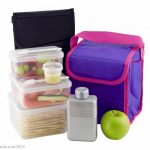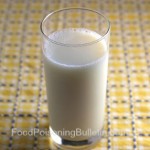Most schools in the United States start next Tuesday, after Labor Day. That prospect can be daunting for parents who provide lunches and snacks for their kids to tote to school, but Uncle Sam has some advice about making back to school meal prep easy. First, it's important to plan out the menu for the week. Look for recipes you know your kids will like, then create a shopping list based on the foods you need. Make sure, at the store, that you put any refrigerated or frozen foods into the cart last, just before you check out. And those items must be put in the refrigerator or freezer within two hours after you finish shopping. Safe food preparation is next on the checklist for back to school lunches. Make sure that your kitchen is clean before you start to cook and prepare foods. … [Read more...]
Back to School Food Safety Tips
It's almost time for the new school year to begin. As parents start to prepare, it's important to consider back to school food safety if you pack lunches or snacks for your child. The government is offering tips on keeping your children safe from foodborne illness. It's important that you always use an insulated carrier to pack the food your child takes to school. If the lunch or snack contains a perishable food such as meat, eggs, cheese, or yogurt, always use at least two cold sources in the insulated carrier. You can use commercial freezer packs, frozen juice boxes, or frozen water containers. The last two will thaw in time for lunch while it keeps the temperature in the carrier below 40°F. Never use a paper bag to pack lunches or snacks for your child. Perishable cold foods … [Read more...]
Packed Lunch Food Safety
As the new school year gets underway, parents need to know how to pack lunches safely. Food poisoning can be very serious for young children, so their food needs to be as safe as possible. The FDA has more information about safe bag lunches. Know that all perishable foods, including meat, poultry, seafood, dairy products, and eggs, should be kept cold at all times. Any of these foods should not be left at room temperature longer than 2 hours - 1 hour if the air temperature is over 90°F. Wash your hands well with soap and water for at least 20 seconds before you start to prepare the food and pack the lunch. Sanitize a lunch box that hasn't been used in a while by wiping it with a solution of 1 tablespoon liquid chlorine, unscented bleach in 1 gallon of water. Advance planning … [Read more...]
Back to School Food Safety
With everyone getting ready to go back to school, there are some steps you can take to make sure your child's lunch is safe. Foodsafety.gov is offering some tips to consumers. When you buy a lunch box, make sure that it is insulated, with enough room for two cold sources to keep the food safe. Perishable foods must be kept below 40°F to prevent bacterial growth. Make sure that the lunch box is easy to clean. Always wash all reusable food storage containers with hot, soapy water after each use. Thermoses should be tested before use to make sure they can keep hot foods hot and cold foods cold. Fill it with hot water and let the thermos stand at room temperature for 4 to 6 hours. Then test the water with a reliable food thermometer and make sure it is at least 140°F, the safe … [Read more...]
Monroe Montessori School in WA Closed for Possible E. coli
According to the Snohomish Health District in Washington state, two young children have been hospitalized for complications from a Shiga toxin-producing E. coli (STEC) infection. The school they attend, at 733 Village Way in Monroe, Washington has been temporarily closed because other children and staff may have been exposed to the bacteria. Dr. Gary Goldblum, health officer and director of the Health District said, "the exact source of contamination in E. coli can be very difficult to identify, but at this point we believe the children were likely exposed to livestock near their home. The school has been cooperating fully as we work with the families and improve existing policies and procedures to prevent these incidents from happening in the future." Livestock carry E. coli … [Read more...]
Back to School Food Safety Tips
FoodSafety.gov is offering tips to parents and caregivers about packing safe back to school lunches as the time for the new year approaches. Bacteria that cause foodborne illness are everywhere, including in food itself, on packaging, utensils, and even napkins and plates. They grow quickly at temperatures between 40 and 140°F. In just two hours, the bacteria in foods can grow quickly enough to cause foodborne illness. To keep your child safe and healthy, remember the four steps to food safety: Clean, Separate, Cook, and Chill. These rules must be followed to avoid food poisoning. If the lunch you are packing contains perishable foods such as lunch meats, eggs, cheese, or yogurt, pack it with at least two cold sources. You can use frozen gel packs, frozen juice boxes, or frozen … [Read more...]
More E. coli Infections Reported in Whatcom County Fest Outbreak
Children dominate a growing list of case patients in the outbreak of E. coli O157:H7 linked to the 22nd annual Milk Makers Festival in Whatcom County, Washington. According to the county health agency's latest update, 41 people have fallen ill with classic E. coli symptoms after attending the Milk Makers event from schools all over the county. The working total of 41 case patients includes people who got sick after having close contact with a sick attendee. Seven of the 41 victims have been hospitalized, but the county has not said anything about their conditions. "Most of the cases involve children who attended the event,'' said a news release from Whatcom County Health Officer Dr. Greg Stern. "Several older children involved with the event and some adults and close contacts of cases … [Read more...]
Milk Makers Fest Mixed E. Coli and School Children at Fairgrounds
It was the 22nd annual Milk Makers Festival in Whatcom County, Washington, and 25 Lynden High School students helped set up a hay maze to go with a petting zoo, scavenger hunt and activities for younger kids to learn about raising calves and milking cows. When more than 1,300 first graders and their chaperones arrived for the three-day fest at Northwest Fairgrounds late last month, they also were joined by invisible pathogens from animal feces that caused an outbreak of potentially fatal E. coli infections, including a dreaded complication known as HUS E. coli. Lawyers for the childrens' families, scientists from the Whatcom County Health Department, state epidemiologists -- even experts from the Centers for Disease Control and Prevention -- are now trying to determine what went wrong. … [Read more...]
School Outbreak in Maine Sickened 22 Children Last Week
According to the Portland Press Herald, 22 Portland schoolchildren were sickened with food poisoning last week at Reiche Elementary School. Officials suspect a pickled beet salad may be the culprit. School officials alerted public health officials when student began to throw up about an hour after lunch on Tuesday, March 17, 2015. The cafeteria at Reiche was the only school in the public school system to serve that beet salad that day. There were no illnesses in the rest of the district. Lab results are pending. No students needed to see the doctor. Twenty-one of the twenty-two sickened students returned to school the next day. The school district's central kitchen and the kitchen at Reiche School were inspected by public health officials. While the district kitchens passed … [Read more...]
Employee at Passaic Schools in New Jersey Has Hepatitis A
A high school cafeteria employee in the Passaic, New Jersey schools has been diagnosed with hepatitis A, according to a letter sent to parents by the Passaic New Jersey Superintendent of Schools. Anyone who bought food from the Passaic High School teacher's cafeteria between January 15 and January 30, 2015 may have been exposed to the virus. The High School has been thoroughly cleaned to disinfect the building. Hepatitis A is a virus that causes injury to the liver. The virus is shed in the feces of the infected person. When a person with the virus doesn't wash their hands after using the bathroom, the feces and virus can get into food or drink they have prepared. When someone else eats or drinks those products, they can get sick; this is called the "fecal-oral" transmission. Direct … [Read more...]












